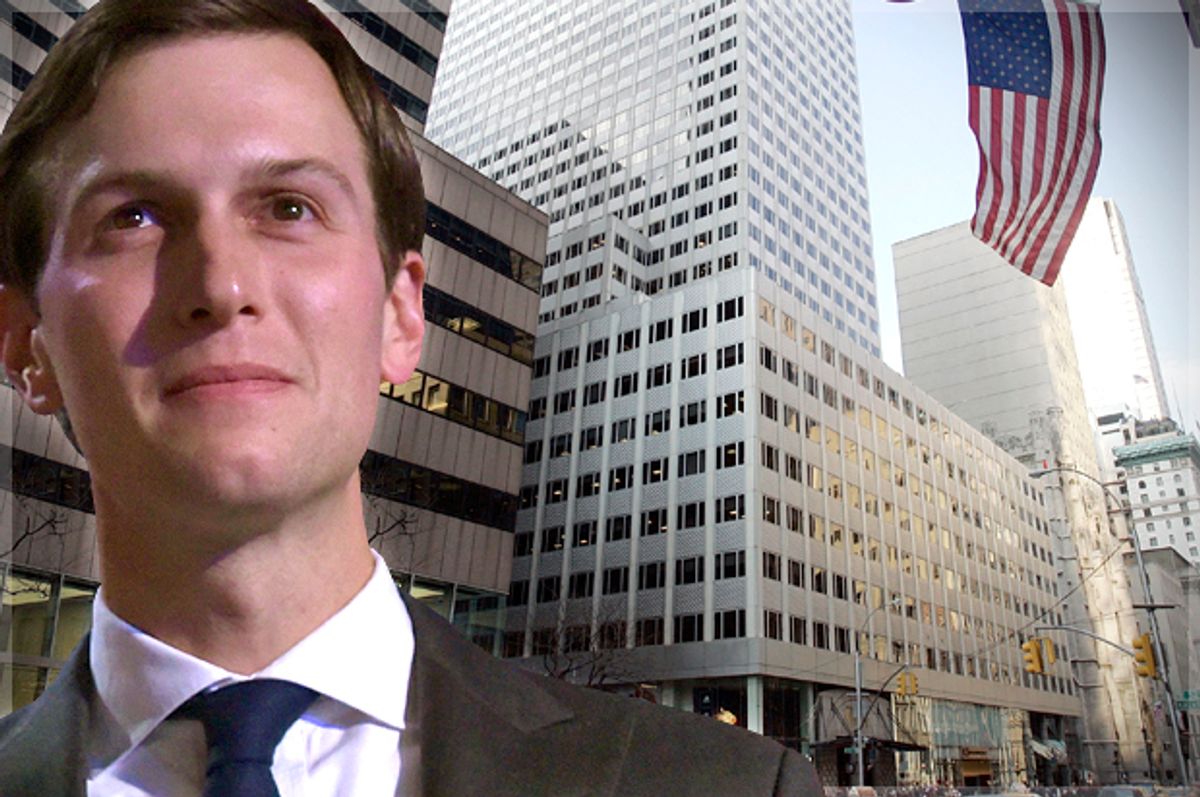President-elect Donald’s Trump’s son-in-law Jared Kushner, who was named Monday as senior adviser to the next president, has announced through his lawyer that he will be divesting many of his assets and stepping down as head of his multibillion-dollar real estate business, Kushner Companies, in order to avoid conflicts of interest.
But government ethics experts say Kushner’s divestment strategy is unusual and conflicts of interest will remain. Many of Kushner’s assets will remain in family control. He plans to sell his New York Observer newspaper to his venture capitalist bother Joshua while his mother Seryl will control a trust that will include Kushner’s stake in New York City’s 666 Fifth Avenue building, which Kushner Companies bought in 2007 for $1.8 billion.
The issue raises ethical concerns about whether Trump’s son-in-law would truly be separated from his personal interests. As a real estate magnate, he has routinely relied on foreign investments for the billions of dollars of acquisitions his company has made in recent years. Trump is likely to seek Kushner’s counsel on issues pertaining to global trade. In order to get around a 50-year-old anti-nepotism law that prevents public officials from hiring relatives, the billionaire businessman married to Trump’s entrepreneurial daughter, Ivanka, will not draw a salary for his White House job.
“We’re used to president-elects and presidential appointees who actually appear to have some respect for government ethics laws and actually want to comply with the laws that are intended to protect the public trust,” Kathleen Clark, a practicing attorney and professor of law who specializes in government ethics and corruption at Washington University in St. Louis, told Salon. “In the past that’s what we’ve had. This is a whole other animal.”
Jamie Gorelick, Kushner’s attorney from the law firm WilmerHale, told Politico on Monday that Kushner “is committed to complying with federal ethics laws and we have been consulting with the Office of Government Ethics regarding the steps he would take.”
Details about exactly how Kushner will divest his interests have not been fully disclosed. WilmerHale did not respond to Salon’s request for comment. One possibility remains that Kushner could simply reacquire his assets from his mother and brother after he leaves office.
“This quick shuffling of assets among family members could easily be undone immediately after Mr. Kushner leaves the Trump Administration, which calls into question whether these transactions actually help resolve any conflict issues,” Matthew T. Sanderson, a lawyer at Caplin & Drysdale and former general counsel to Sen. Rand Paul’s presidential campaign, told Salon. “I am not aware of any commitment by Mr. Kushner to permanently divest himself of these assets.”
Recent negotiations that Kushner has had with foreign business interests highlight the issues he and his father-in-law are raising as they work in government.
On Saturday The New York Times reported that just days after Trump won the Nov. 8 election, Kushner met in New York with Wu Xiaohui, chairman of Anbang Insurance Group, to discuss a joint venture with Kushner Companies to refurbish 666 Fifth Avenue, which serves as the headquarters for some of the city’s prestigious law firms, hedge funds and private equity investors, as well as Kushner’s own offices. According to anonymous sources cited by the Times, Wu toasted Trump’s victory and expressed his desire to meet with the president-elect.
With a secretive ownership structure and close ties to China’s politically connected leaders, Anbang has been struggling to acquire more U.S. assets. In October U.S. authorities blocked Anbang from buying a hotel in San Diego because of its proximity to a U.S. naval base, which raised concerns that the hotel could be used by Chinese spies to track activity at the base. During a visit to the United Nations in September, President Barack Obama broke tradition by not staying at New York City’s regal Waldorf Astoria hotel, which had been purchased by Anbang in 2014 in a $1.95 billion deal. Officials cited cited security concerns amid a series of attempted email phishing attacks targeting U.S. government agencies, including the White House, believed to have originated in China.
A joint venture between Kushner Companies and Anbang is just one potential eyebrow-raising example of what could happen if Kushner doesn’t divorce himself completely from his potentially conflict-generating assets while serving the public’s interests in the White House. Trump also faces this problem but is so far not following a more than 40-year-tradition of setting up a blind trust.
Jordan Libowitz, spokesman for the Citizens for Responsibility and Ethics in Washington, said the Kushner’s decision to divest assets is a step in the right direction, “although we advise that the best arrangement is always a blind trust, where the trustee is someone truly independent from the official, so that the official would not be able to tell what would become of the assets held in trust.”
Having your mom handle your assets while you spend a few years at the White House, presumably serving the public, may not be good enough.

Shares